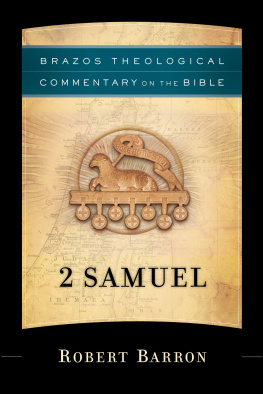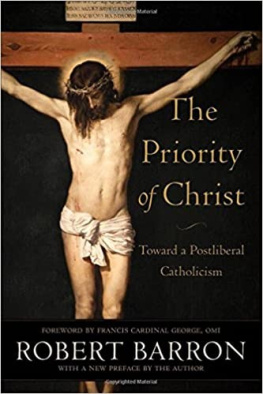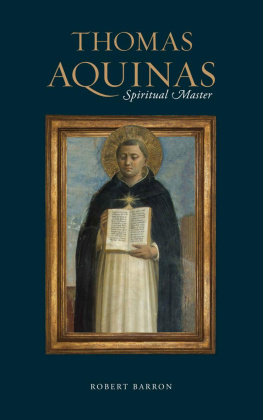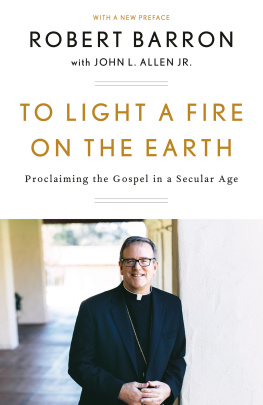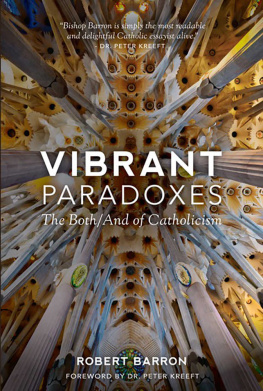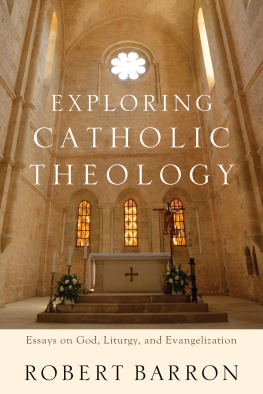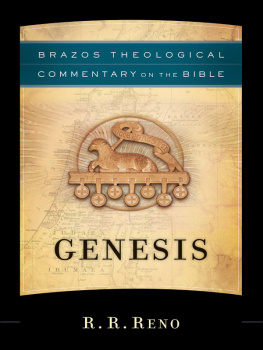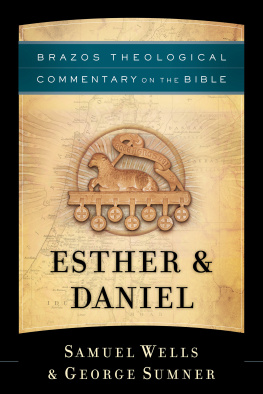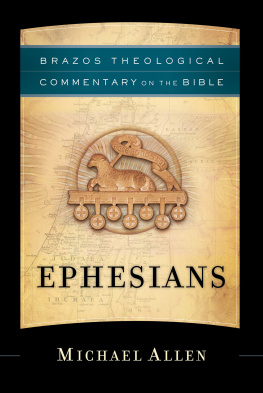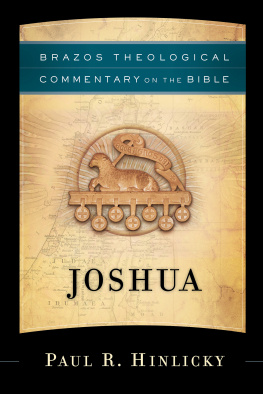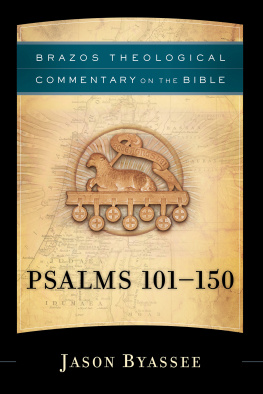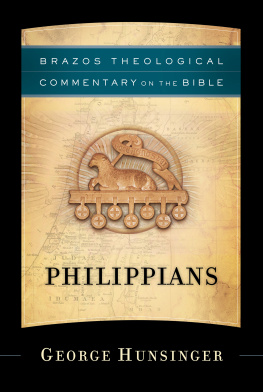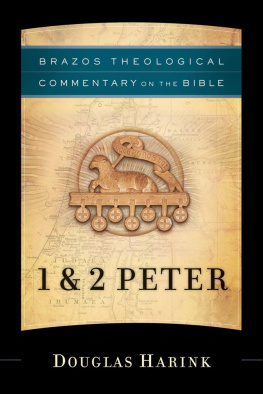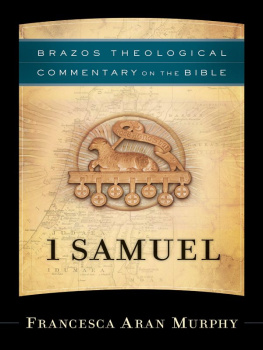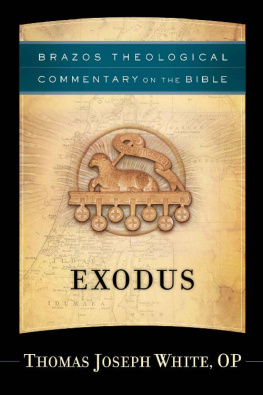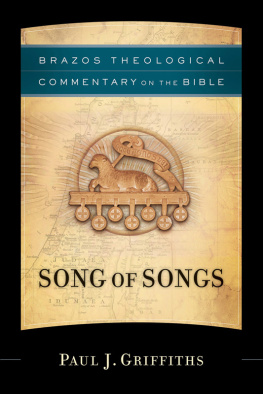Robert Barron - 2 Samuel
Here you can read online Robert Barron - 2 Samuel full text of the book (entire story) in english for free. Download pdf and epub, get meaning, cover and reviews about this ebook. year: 2015, publisher: Baker Publishing Group, genre: Religion. Description of the work, (preface) as well as reviews are available. Best literature library LitArk.com created for fans of good reading and offers a wide selection of genres:
Romance novel
Science fiction
Adventure
Detective
Science
History
Home and family
Prose
Art
Politics
Computer
Non-fiction
Religion
Business
Children
Humor
Choose a favorite category and find really read worthwhile books. Enjoy immersion in the world of imagination, feel the emotions of the characters or learn something new for yourself, make an fascinating discovery.
- Book:2 Samuel
- Author:
- Publisher:Baker Publishing Group
- Genre:
- Year:2015
- Rating:3 / 5
- Favourites:Add to favourites
- Your mark:
- 60
- 1
- 2
- 3
- 4
- 5
2 Samuel: summary, description and annotation
We offer to read an annotation, description, summary or preface (depends on what the author of the book "2 Samuel" wrote himself). If you haven't found the necessary information about the book — write in the comments, we will try to find it.
2 Samuel — read online for free the complete book (whole text) full work
Below is the text of the book, divided by pages. System saving the place of the last page read, allows you to conveniently read the book "2 Samuel" online for free, without having to search again every time where you left off. Put a bookmark, and you can go to the page where you finished reading at any time.
Font size:
Interval:
Bookmark:
Brazos Theological Commentary on the Bible
Series Editors
R. R. Reno, General Editor
Creighton University
Omaha, Nebraska
Robert W. Jenson
Center of Theological Inquiry
Princeton, New Jersey
Robert Louis Wilken
University of Virginia
Charlottesville, Virginia
Ephraim Radner
Wycliffe College
Toronto, Ontario
Michael Root
Lutheran Theological Southern Seminary
Columbia, South Carolina
George Sumner
Wycliffe College
Toronto, Ontario

2015 by Robert Barron
Published by Brazos Press
a division of Baker Publishing Group
P.O. Box 6287, Grand Rapids, MI 49516-6287
www . brazospress .com
Ebook edition created 2015
All rights reserved. No part of this publication may be reproduced, stored in a retrieval system, or transmitted in any form or by any meansfor example, electronic, photocopy, recordingwithout the prior written permission of the publisher. The only exception is brief quotations in printed reviews.
Library of Congress Cataloging-in-Publication Data is on file at the Library of Congress, Washington, DC.
ISBN 978-1-4412-2196-4
Scripture quotations are from the New Revised Standard Version of the Bible, copyright 1989, by the Division of Christian Education of the National Council of the Churches of Christ in the United States of America. Used by permission. All rights reserved.
To Jim and Molly Perry,
Heroes of the New Evangelization
Cover
Series Page
Title Page
Copyright Page
Dedication
Acknowledgments
Series Preface
Introduction
Series One: David Comes to Power
2 Samuel 1
2 Samuel 2
Series Two: Priest and King
2 Samuel 3
2 Samuel 4
2 Samuel 5
2 Samuel 6
2 Samuel 7
2 Samuel 8
2 Samuel 9
2 Samuel 10
2 Samuel 11
Series Four: A Sword Will Never Leave Your House
2 Samuel 12
2 Samuel 13
2 Samuel 14
2 Samuel 15
2 Samuel 16
2 Samuel 17
2 Samuel 18
2 Samuel 19
2 Samuel 20
Series Five: Toward the Temple
2 Samuel 21
2 Samuel 22
2 Samuel 23
2 Samuel 24
Bibliography
Subject Index
Scripture Index
Back Cover
Writing this book was a joy. Though I have long been a student of the Bible, most of my published work has been in the fields of philosophy, theology, and spirituality. To delve deeply, therefore, into the text of 2 Samuel itself, as well as to explore the rich and fascinating tradition of commentary upon it, both ancient and modern, was thrilling and illuminating.
For giving me the opportunity to roam through at least this small corner of the biblical world, I am very grateful to Rusty Reno, the general editor of the Brazos series. I am also deeply indebted to Jack Thornton, who helped enormously with the research required to finish this project. Jacks patience, diligence, and concentration throughout the lengthy process were impressive indeed. I want to thank as well Brandon Vogt, who read the text with great care and who was an indispensable help in getting it into publishable shape. A word of gratitude also to Prof. Robert Louis Wilken, Fr. Robert Schoenstene, and Dr. Matthew Levering, all of whom read the manuscript and made extremely helpful suggestions for its improvement. I want, finally, to express my thanks to my good friend Fr. Stephen Grunow, who thought through this project with me from beginning to end and made the book far better than it would have been without his wise guidance.
Near the beginning of his treatise against Gnostic interpretations of the Bible, Against Heresies , Irenaeus observes that scripture is like a great mosaic depicting a handsome king. It is as if we were owners of a villa in Gaul who had ordered a mosaic from Rome. It arrives, and the beautifully colored tiles need to be taken out of their packaging and put into proper order according to the plan of the artist. The difficulty, of course, is that scripture provides us with the individual pieces, but the order and sequence of various elements are not obvious. The Bible does not come with instructions that would allow interpreters to simply place verses, episodes, images, and parables in order as a worker might follow a schematic drawing in assembling the pieces to depict the handsome king. The mosaic must be puzzled out. This is precisely the work of scriptural interpretation.
Origen has his own image to express the difficulty of working out the proper approach to reading the Bible. When preparing to offer a commentary on the Psalms he tells of a tradition handed down to him by his Hebrew teacher:
The Hebrew said that the whole divinely inspired scripture may be likened, because of its obscurity, to many locked rooms in our house. By each room is placed a key, but not the one that corresponds to it, so that the keys are scattered about beside the rooms, none of them matching the room by which it is placed. It is a difficult task to find the keys and match them to the rooms that they can open. We therefore know the scriptures that are obscure only by taking the points of departure for understanding them from another place because they have their interpretive principle scattered among them.
As is the case for Irenaeus, scriptural interpretation is not purely local. The key in Genesis may best fit the door of Isaiah, which in turn opens up the meaning of Matthew. The mosaic must be put together with an eye toward the overall plan.
Irenaeus, Origen, and the great cloud of premodern biblical interpreters assumed that puzzling out the mosaic of scripture must be a communal project. The Bible is vast, heterogeneous, full of confusing passages and obscure words, and difficult to understand. Only a fool would imagine that he or she could work out solutions alone. The way forward must rely upon a tradition of reading that Irenaeus reports has been passed on as the rule or canon of truth that functions as a confession of faith. Anyone, he says, who keeps unchangeable in himself the rule of truth received through baptism will recognize the names and sayings and parables of the scriptures. Modern scholars debate the content of the rule on which Irenaeus relies and commends, not the least because the terms and formulations Irenaeus himself uses shift and slide. Nonetheless, Irenaeus assumes that there is a body of apostolic doctrine sustained by a tradition of teaching in the church. This doctrine provides the clarifying principles that guide exegetical judgment toward a coherent overall reading of scripture as a unified witness. Doctrine, then, is the schematic drawing that will allow the reader to organize the vast heterogeneity of the words, images, and stories of the Bible into a readable, coherent whole. It is the rule that guides us toward the proper matching of keys to doors.
If self-consciousness about the role of history in shaping human consciousness makes modern historical-critical study critical, then what makes modern study of the Bible modern is the consensus that classical Christian doctrine distorts interpretive understanding. Benjamin Jowett, the influential nineteenth-century English classical scholar, is representative. In his programmatic essay On the Interpretation of Scripture, he exhorts the biblical reader to disengage from doctrine and break its hold over the interpretive imagination. The simple words of that book, writes Jowett of the modern reader, he tries to preserve absolutely pure from the refinements or distinctions of later times. The modern interpreter wishes to clear away the remains of dogmas, systems, controversies, which are encrusted upon the words of scripture. The disciplines of close philological analysis would enable us to separate the elements of doctrine and tradition with which the meaning of scripture is encumbered in our own day. The lens of understanding must be wiped clear of the hazy and distorting film of doctrine.
Font size:
Interval:
Bookmark:
Similar books «2 Samuel»
Look at similar books to 2 Samuel. We have selected literature similar in name and meaning in the hope of providing readers with more options to find new, interesting, not yet read works.
Discussion, reviews of the book 2 Samuel and just readers' own opinions. Leave your comments, write what you think about the work, its meaning or the main characters. Specify what exactly you liked and what you didn't like, and why you think so.

